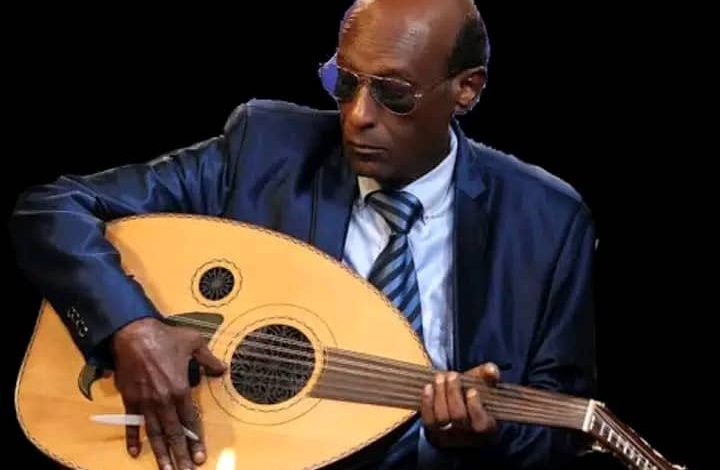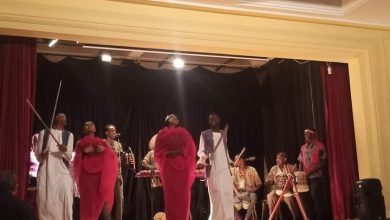Society & Culture
Mohammed al Amin: The Myth of love and Revolution

Khartoum – Sudan Events
On November 12, 2023, Mohammed al Amin passed away in the United States. May he rest in peace, and may his legacy of advocating for peace and love for Sudan endure, inspiring generations to come.
Mohammed al Amin, born on February 20, 1943, in Wad Medani, Sudan, was a renowned Sudanese musician celebrated for his international fame. His distinctive singing style, adept oud playing, and outspoken lyrics marked a significant contribution to the world of music.
Born in central Sudan, al Amin started his musical journey at the age of 11, demonstrating exceptional talent by composing his first pieces at 20.
Throughout his illustrious career, al Amin not only crafted his own lyrics but also incorporated the works of renowned Sudanese poets such as Fadlallah Mohamed and Mahjoub Sharif. His composition “The Epic of October” following the successful 1964 revolution underscored his patriotic spirit. Despite facing political repression and imprisonment during Nimeiri’s regime in the 1970s, al Amin’s dedication to his craft persisted.
In response to the military coup in 1989, al Amin chose exile in Cairo to avoid further complications. Returning to Khartoum in 1994, he maintained a low profile while enjoying immense popularity that transcended borders, leading him to perform in various countries, including the United Arab Emirates, Europe, China, and the United States.
One of his notable songs, “Raja’ al balad” (He is Home), highlighted the allegiance of Sudanese in exile and his enduring connection to the nation.
His contributions to music and his commitment to his homeland will be remembered and cherished.
The beginning of his artistic career:
In 1960, Mohammad Al-Amin joined the Blue Nile Police Music Department, headed by musician Muhammad Adam Al-Mansouri in the presence of a large number of the most distinguished musicians at that time in Wad Medani, e.g. Hussein Batari. At that time, Mohammad Al-Amin excelled in performing songs by other singers who preceded him in performance, e.g. Abdul Karim Al-Kabli and Mohammad Wardi, which revealed his great vocal abilities and gained him popularity and fans in Wad Medani.
The audience loved his performance of the song in “the castle and its essence” from the lyrics produced by Salah Abdel Sayed which became the first ticket to Mohammed Al-Amin song (Me and Beloved one) from the lyrics of the poet Mohamed Ali Jabara where he composed and performed beautiful images allowing him to leave his print on the Sudanese radio and captured its audiences.
Then he appeared in the program “Forms and Colors” that was presented by Mr. Ahmed Zubair, and the presentation of the song (Deprivation and Hope) by the poet Radwan Mohammad Ahmed was well acclaimed and celebrated that it heralded this talent coming from the land of the island.
His role in developing the Sudanese song
Mohammed Al-Amin was characterized by his vocal and melodic abilities that were described as not easy to imitate. Very few of Mohammed al-Amin’s songs were composed by others. Any melody developed by Mohammed Al-Amin beared his artistic fingerprints that do not resemble any other fingerprints, and the performer of his songs may suffer from this, and perhaps this is the reason that there are nowadays very few young singers to imitate him.
The musician Osama Beclaw believes that the color of the melodies of Al-Amin is classic in its form by the presence of musical introductions and various sections, and that he is very influenced by the melodic school of the Egyptian singer Mohamed Abdel Wahab, whose influence was great in terms of the great songs performed by the artist um Kulthum,
Mohammed Al-Amin sang all types of national, emotional and heritage lyrics, but in all of them he showed superior abilities to make the listener realize their breathtaking beauty.
Mohamed Al-Amin was the first to sing for the October Revolution, just one month after the revolution, he composed an anthem written by Fadlallah Mohamed, inside the military prison during his arrest before the end of Abboud’s military rule.
Mohamed Al-Amin participated in many singing festivals inside and outside Sudan and presented many concerts in Arab and European countries including the United States of America, and the most important festivals were the first cultural festival in Algeria, the International Youth Festival in Moscow, the artistic music festival in the Netherlands as well as several festivals in Germany. His last participation in 2014 was in China accompanied by Chinese musicians and it was recorded for the Chinese national television.
Al-Neelain University awarded an honorary doctorate to Professor Muhammad Al-Amin in 2010
The Presidency of the Republic awarded him the Order of Merit on the anniversary of independence 2014.
He is survived by his spouse Suad Malik and a number of children.



